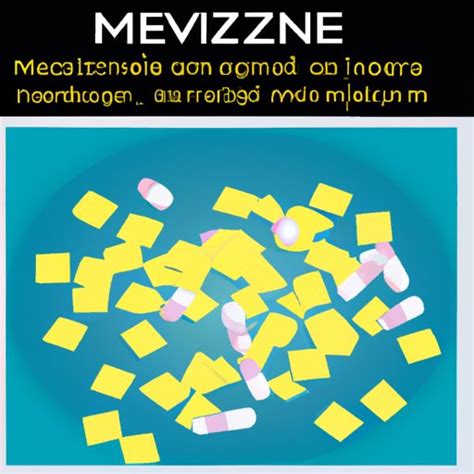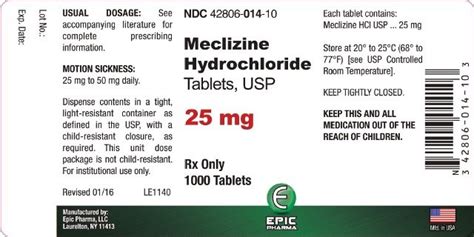Intro
Discover what Meclizine is, its uses, and benefits. Learn about this antihistamines role in treating vertigo, motion sickness, and dizziness, and explore its side effects, interactions, and dosage instructions.
Meclizine is a medication that has been widely used for the treatment of various health conditions, including vertigo, motion sickness, and nausea. It is an antihistamine that works by affecting the inner ear and the brain, helping to reduce the symptoms of these conditions. Meclizine is available over-the-counter (OTC) in many countries and is often recommended by healthcare professionals for the management of mild to moderate symptoms.
Meclizine has been in use for several decades, and its effectiveness in treating vertigo and motion sickness has been well-documented. It is often preferred over other medications due to its relatively mild side effects and low risk of addiction. However, like all medications, meclizine can cause some side effects, and it is essential to follow the recommended dosage and consult with a healthcare professional before taking it.
The importance of understanding meclizine and its uses cannot be overstated. With the rise of online health information, many people are turning to the internet to self-diagnose and self-medicate. While this can be helpful, it is crucial to consult with a healthcare professional before taking any medication, including meclizine. They can help determine the underlying cause of symptoms and recommend the best course of treatment.
What is Meclizine Used For?

Meclizine is primarily used to treat vertigo, which is a type of dizziness that can cause a person to feel like they or their surroundings are spinning. It is also used to prevent and treat motion sickness, which can cause nausea, vomiting, and dizziness. Additionally, meclizine may be used to treat other conditions, such as nausea and vomiting caused by inner ear problems.
Meclizine works by affecting the inner ear and the brain, helping to reduce the symptoms of vertigo and motion sickness. It is thought to work by blocking the action of histamine, a chemical that is involved in the transmission of signals from the inner ear to the brain. By blocking histamine, meclizine can help to reduce the symptoms of vertigo and motion sickness.
Benefits of Meclizine
The benefits of meclizine are numerous. Some of the most significant advantages of using meclizine include: * Fast and effective relief from vertigo and motion sickness symptoms * Mild side effects compared to other medications * Low risk of addiction * Available over-the-counter in many countries * Can be used to prevent and treat motion sicknessHow Does Meclizine Work?

Meclizine works by affecting the inner ear and the brain, helping to reduce the symptoms of vertigo and motion sickness. It is thought to work by blocking the action of histamine, a chemical that is involved in the transmission of signals from the inner ear to the brain. By blocking histamine, meclizine can help to reduce the symptoms of vertigo and motion sickness.
The exact mechanism of action of meclizine is not fully understood, but it is thought to involve the blocking of histamine receptors in the inner ear and brain. This can help to reduce the symptoms of vertigo and motion sickness, including dizziness, nausea, and vomiting.
Side Effects of Meclizine
While meclizine is generally well-tolerated, it can cause some side effects. Some of the most common side effects of meclizine include: * Drowsiness * Dizziness * Headache * Nausea * VomitingThese side effects are usually mild and temporary, but they can be more severe in some cases. It is essential to follow the recommended dosage and consult with a healthcare professional before taking meclizine, especially if you have any underlying medical conditions or are taking other medications.
Meclizine Dosage and Administration

The dosage and administration of meclizine vary depending on the condition being treated and the individual's response to the medication. Meclizine is available in tablet and capsule form, and it is usually taken orally.
For the treatment of vertigo, the recommended dosage of meclizine is 25-50 mg per day, taken in divided doses. For the prevention and treatment of motion sickness, the recommended dosage is 25-50 mg per day, taken 1 hour before travel.
It is essential to follow the recommended dosage and consult with a healthcare professional before taking meclizine, especially if you have any underlying medical conditions or are taking other medications.
Precautions and Warnings
While meclizine is generally well-tolerated, there are some precautions and warnings to be aware of. Some of the most significant precautions and warnings include: * Meclizine can cause drowsiness and dizziness, so it is essential to avoid driving or operating heavy machinery while taking the medication. * Meclizine can interact with other medications, including sedatives and tranquilizers, so it is essential to consult with a healthcare professional before taking the medication. * Meclizine is not recommended for use in children under 12 years old, as it can cause serious side effects.Meclizine Interactions

Meclizine can interact with other medications, including sedatives and tranquilizers. Some of the most significant interactions include:
- Sedatives and tranquilizers: Meclizine can increase the risk of drowsiness and dizziness when taken with sedatives and tranquilizers.
- Antihistamines: Meclizine can increase the risk of drowsiness and dizziness when taken with other antihistamines.
- Anti-anxiety medications: Meclizine can increase the risk of drowsiness and dizziness when taken with anti-anxiety medications.
It is essential to consult with a healthcare professional before taking meclizine, especially if you are taking other medications.
Meclizine and Pregnancy
Meclizine is not recommended for use during pregnancy, as it can cause serious side effects in the fetus. Some of the most significant risks include: * Birth defects * Low birth weight * Premature birthIt is essential to consult with a healthcare professional before taking meclizine during pregnancy.
Meclizine and Breastfeeding

Meclizine is not recommended for use during breastfeeding, as it can cause serious side effects in the baby. Some of the most significant risks include:
- Drowsiness
- Dizziness
- Nausea
- Vomiting
It is essential to consult with a healthcare professional before taking meclizine during breastfeeding.
Meclizine Alternatives
There are several alternatives to meclizine, including: * Dimenhydrinate * Diphenhydramine * ScopolamineThese medications can be used to treat vertigo and motion sickness, but they may have different side effects and interactions.
Conclusion and Final Thoughts

In conclusion, meclizine is a medication that has been widely used for the treatment of vertigo and motion sickness. It is an antihistamine that works by affecting the inner ear and the brain, helping to reduce the symptoms of these conditions. While meclizine is generally well-tolerated, it can cause some side effects, and it is essential to follow the recommended dosage and consult with a healthcare professional before taking the medication.
We hope this article has provided you with a comprehensive understanding of meclizine and its uses. If you have any questions or comments, please feel free to share them below. We would love to hear from you and help you in any way we can.
What is meclizine used for?
+Meclizine is used to treat vertigo, motion sickness, and nausea.
How does meclizine work?
+Meclizine works by affecting the inner ear and the brain, helping to reduce the symptoms of vertigo and motion sickness.
What are the side effects of meclizine?
+The side effects of meclizine include drowsiness, dizziness, headache, nausea, and vomiting.
